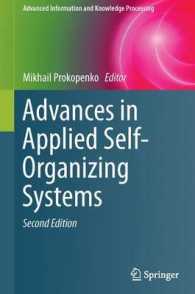Full Description
Handbook of Educational Psychology and Students with Special Needs provides educational and psychological researchers, practitioners, policy-makers, and graduate students with critical expertise on the factors and processes relevant to learning for students with special needs. This includes students with attention-deficit/hyperactivity disorder, other executive function difficulties, behavior and emotional disorders, autism spectrum disorder, intellectual disabilities, learning disabilities, dyslexia, language and communication difficulties, physical and sensory disabilities, and more. With the bulk of educational psychology focused on "mainstream" or "typically developing" learners, relatively little educational psychology theory, research, measurement, or practice has attended to students with "special needs." As clearly demonstrated in this book, the factors and processes studied within educational psychology—motivation and engagement, cognition and neuroscience, social-emotional development, instruction, home and school environments, and more—are vital to all learners, especially those at risk or disabled.
Integrating guidance from the DSM-5 by the American Psychiatric Association and the International Classification of Diseases (ICD-10) by the World Health Organization, this book synthesizes and builds on existing interdisciplinary research to establish a comprehensive case for effective psycho-educational theory, research, and practice that address learners with special needs. Twenty-seven chapters by experts in the field are structured into three parts on diverse special needs categories, perspectives from major educational psychology theories, and constructs relevant to special needs learning, development, and knowledge building.
Contents
Contents
Acknowledgments
Ch 1
Introduction: Educational Psychology and Students with Special Needs
Andrew J. Martin, Kristie J. Newton, Rayne A. Sperling
SECTION 1: Special Needs and Educational Psychology
Section Introduction: Students with Special Needs and Educational Psychology
Rayne A. Sperling
Ch 2
Specific Learning Disabilities as a Working Memory Deficit: A Model Revisited
H. Lee Swanson
Ch 3
Identifying and Supporting Students with Affective Disorders in Schools: Academic Anxieties and Emotional Information Processing
Jerrell C. Cassady and Christopher L. Thomas
Ch 4
The Importance of Self-determination and Inclusion for Students with Intellectual Disability: What We Know and What We Still Need to Discover
Iva Strnadova
Ch 5
The Roles of Executive Functions in Learning and Achievement
D. Jake Follmer and Rayne A. Sperling
Ch 6
Language impairments: Challenges and opportunities for meeting children's needs and insights from psycho-educational theory and research
Julie E. Dockrell and Geoff Lindsay
Ch 7
Understanding the Development and Instruction of Reading for English Learners with Learning Disabilities
Colby Hall, Philip Capin, Sharon Vaughn, and Grace Cannon
Ch 8
Developmental Disability
Jeff Sigafoos, Vanessa A. Green, Mark F. O'Reilly, and Giulio E. Lancioni
Ch 9
Child Maltreatment: Pathways to Educational Achievement Through Self-Regulation and Self-Regulated Learning
Carlomagno C. Panlilio and Catherine Corr
Ch 10
Behavioral Disorder: Theory, Research, and Practice
Ming Tak Hue
SECTION 2: Perspectives from Major Educational Psychology Theories
Section Introduction: Perspectives on Special Needs from Major Educational Psychology Theories
Andrew J. Martin
Ch 11
Social Cognitive Theory, Self-Efficacy, and Students with Disabilities: Implications for Students with Learning Disabilities, Reading Disabilities, and Attention-Deficit/Hyperactivity Disorder (ADHD)
Dale H. Schunk and Maria K. DiBenedetto
Ch 12
Self-Determination and Autonomous Motivation: Implications for Students with Intellectual, Developmental, and Specific Learning Disabilities
Michael L. Wehmeyer and Karrie A. Shogren
Ch 13
Using Self-Regulated Learning to Support Students with Learning Disabilities in Classrooms
Nancy E. Perry, Silvia Mazabel, and Nikki Yee
Ch 14
Goal Concepts for Understanding and Improving the Performance of Students with Learning Disabilities
David A. Bergin and Sara L. Prewett
Ch 15
Using Cognitive Load Theory to Improve Text Comprehension for Students with Dyslexia
André Tricot, Geneviève Vandenbroucke, John Sweller
Ch 16
Self-worth Theory and Students with Attention-Deficit/Hyperactivity Disorder (ADHD)
Andrew J. Martin
Ch 17
The Relevance of Expectancy-Value Theory to Understanding the Motivation and Achievement of Students with Cognitive and Emotional Special Needs: Focus on Depression and Anxiety
Allan Wigfield and Annette Ponnock
Ch 18
Control-Value Theory and Students with Special Needs: Achievement Emotion Disorders and their Links to Behavioral Disorders and Academic Difficulties
Reinhard Pekrun and Kristina Loderer
SECTION 3: Special Needs and Constructs Relevant to Psycho-Educational Development
Section Introduction: Special Needs and Constructs Relevant to Psycho-Educational Development
Kristie J. Newton
Ch 19
Improving Learning in Students with Mathematics Difficulties: Contributions from the Science of Learning
Nancy C. Jordan, Christina Barbieri, Nancy Dyson, and Brianna Devlin
Ch 20
Writing and Students with Learning Disabilities
Steve Graham and Karen R. Harris
Ch 21
Reasoning Skills in Individuals with Mathematics Difficulties
Kinga Morsanyi
Ch 22
Interpersonal Relationships and Students with Autism Spectrum Disorder (ASD): Perspectives from Theory of Mind and Neuroscience
Robyn M. Gillies
Ch 23
Student Engagement and Learning, Attention, Behavioral, and Emotional Difficulties in School
Kayleigh C. O'Donnell and Amy L. Reschly
Ch 24
Examining Academic Self-Concepts and the Big-Fish-Little-Pond Effect in Relation to Inclusive and Segregated Classroom Environments for Students with Mild Intellectual Disabilities
Danielle Tracey, Dafna Merom, Alexandre J. S. Morin, and Christophe Maïano
Ch 25
Cultural and Sociocultural Influences and Learners with Special Needs
Angus Macfarlane, Sonja Macfarlane, and Helen Mataiti
Ch 26
Technology and Its Impact on Reading for Students with Learning Disabilities
Cynthia M. Okolo and Ralph Ferretti
Ch 27
The Relevance of Neuroscience to Understanding Achievement in Special Needs Children
James P. Byrnes and Jennifer Taylor Eaton
Ch 28
Conclusion: Future Directions in the Application of Educational Psychology to Students with Special Needs
Andrew J. Martin, Kristie J. Newton, and Rayne A. Sperling
Contributor Bios








